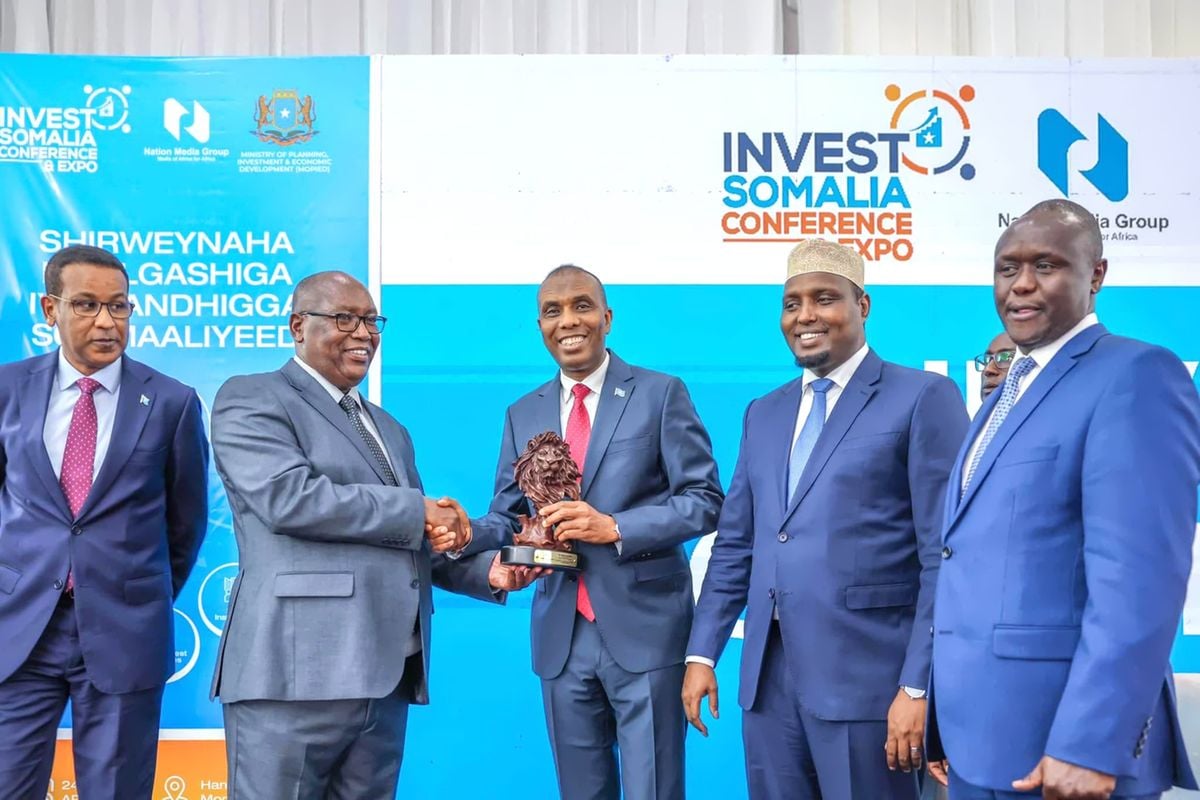Somalia has removed several investment screening regimes that barred the deployment of capital, giving foreigners the green light to wholly own their investments, repatriate capital and enjoy full protection in the country.
Somalia Prime Minister Hamza Abdi Barre said that trade and investment restrictions arising from foreign investment regimes cause output losses of about two percent, hence Somalia’s decision to enact the Investments and Investors Protection Law, 2023 to attract foreign capital.
He said despite its socioeconomic and political challenges, Somalia has turned a new page into an era anchored in the attraction of foreign direct investment while mobilising, consolidating and streamlining local business processes and environment.
Mr Barre was speaking in Mogadishu on April 24, when he officially opened the Invest Somalia Conference & Expo organised by the Nation Media Group in collaboration with Somalia’s Ministry of Planning, Investment and Economic Development and the Somalia Investment Promotion Office.
The PM said his government had designed plans to accelerate economic growth led by the private sector and facilitated by the government.
“My government did put together comprehensive and elaborate, transformative political and security programmes to secure our people, investments as well as our future from insecurity and political instability,” he said.
“In a short time, these programmes have shown greater results, as large swathes of land have been secured for the first time in three decades. In order to navigate in these geopolitical challenges effectively, our approach has been to decouple, de-risk and incentivise foreign investments.”
He said Somalia had begun telling its own positive and progressive story, a sentiment echoed by Nation Media Group CEO Stephen Gitagama, who noted that the African story must be told by African media.
“As a business whose mandate is to not only influence society but also tell stories of success and change, the Nation Media Group has taken the lead in championing the African story. We are a voice of the people, by the people, and that is why we are here today,” Mr Gitagama said.
“Central to the values and the purpose for our establishment is a mission to be a trusted partner to African democracies, a champion of the ordinary person, a voice for the rule of law, and a strong advocate for human rights and free market economies. As the largest media house in East and Central Africa, we seek to ensure that we have products and content that feed the needs of our varied audiences.
As such, we boast a portfolio of 30 content products across four countries. Our weekly regional newspaper, The EastAfrican, focuses on promoting regional integration through a comprehensive analysis of key economic, and political issues of the day and has a footprint across East Africa.”
Mr Gitagama commended Mogadishu for cultivating a favourable business climate, including the establishment of the Somalia Investment Promotion Office and the introduction of a tax system that encourages investment and economic growth.
“The passing of the Anti-Terrorism Law by the Lower House of Parliament in 2023, which seeks to establish a legal structure empowering government security agencies in the fight against terrorism within Somalia, is set to stabilise the security landscape and incentivise foreign investments,” Mr Gitagama said.
He described Somalia as resilient in the face of adversity and emerging as a new frontier for entrepreneurship and investment.
“The theme for this conference, ‘Somalia: The New Frontier for Entrepreneurship & Investment,’ sheds light on a nation that often finds itself overshadowed by its turbulent past but holds immense potential for those bold enough to see beyond the headlines,” he said.
“For decades, Somalia has been plagued by conflict and instability, which have undoubtedly hindered its economic progress. However, amid these challenges, a new narrative is unfolding — one of optimism and opportunity.”
The admission of Somalia to the East African Community (EAC) in 2023 opened investment and trade opportunities for the region.
Economic growth
As an EAC member, the country gains access to a larger market, facilitating trade and investment across borders and also presents a market of 18 million people.
Somalia has abundant natural resources, including oil and gas and fisheries, a strategic location, and a youthful population. It has untapped potential in sectors such as agriculture, renewable energy, telecommunications and tourism.
Its fertile soil offers ideal conditions for agriculture, with the potential to feed its population and the region. Its coastline, one of the longest in Africa, presents opportunities for the development of a thriving maritime industry.
According to the World Bank, Somalia’s economic growth rate increased from 2.2 percent in 2022 to 2.8 percent in 2023 and is projected to reach 4.3 percent by 2028.





















Discussion about this post